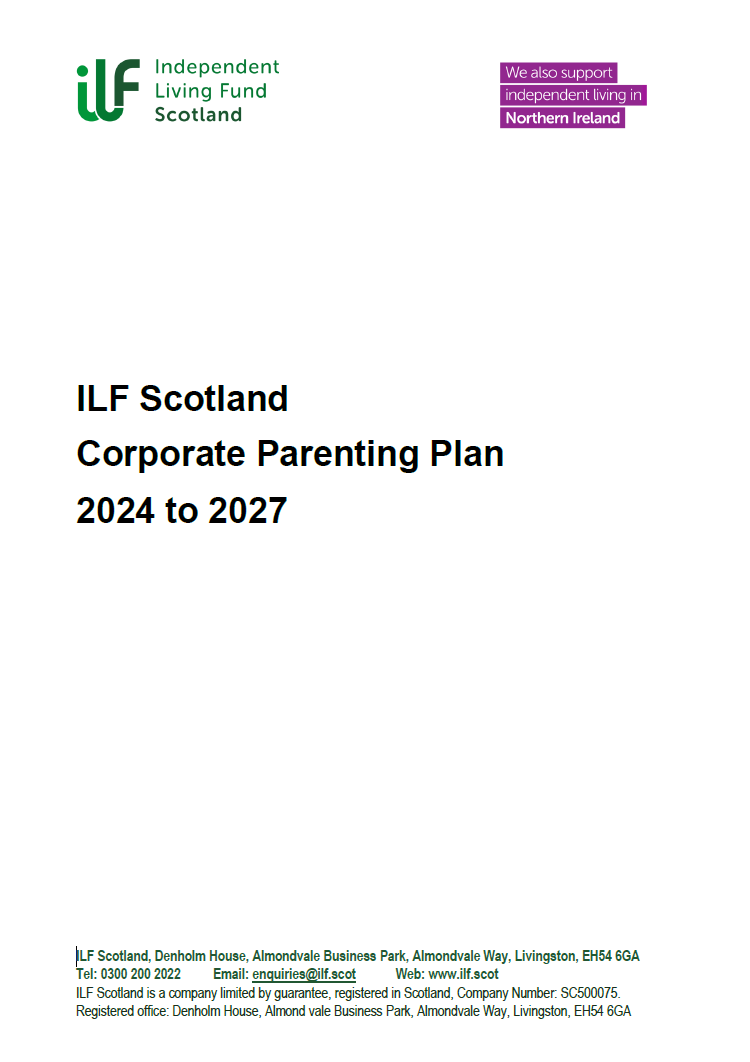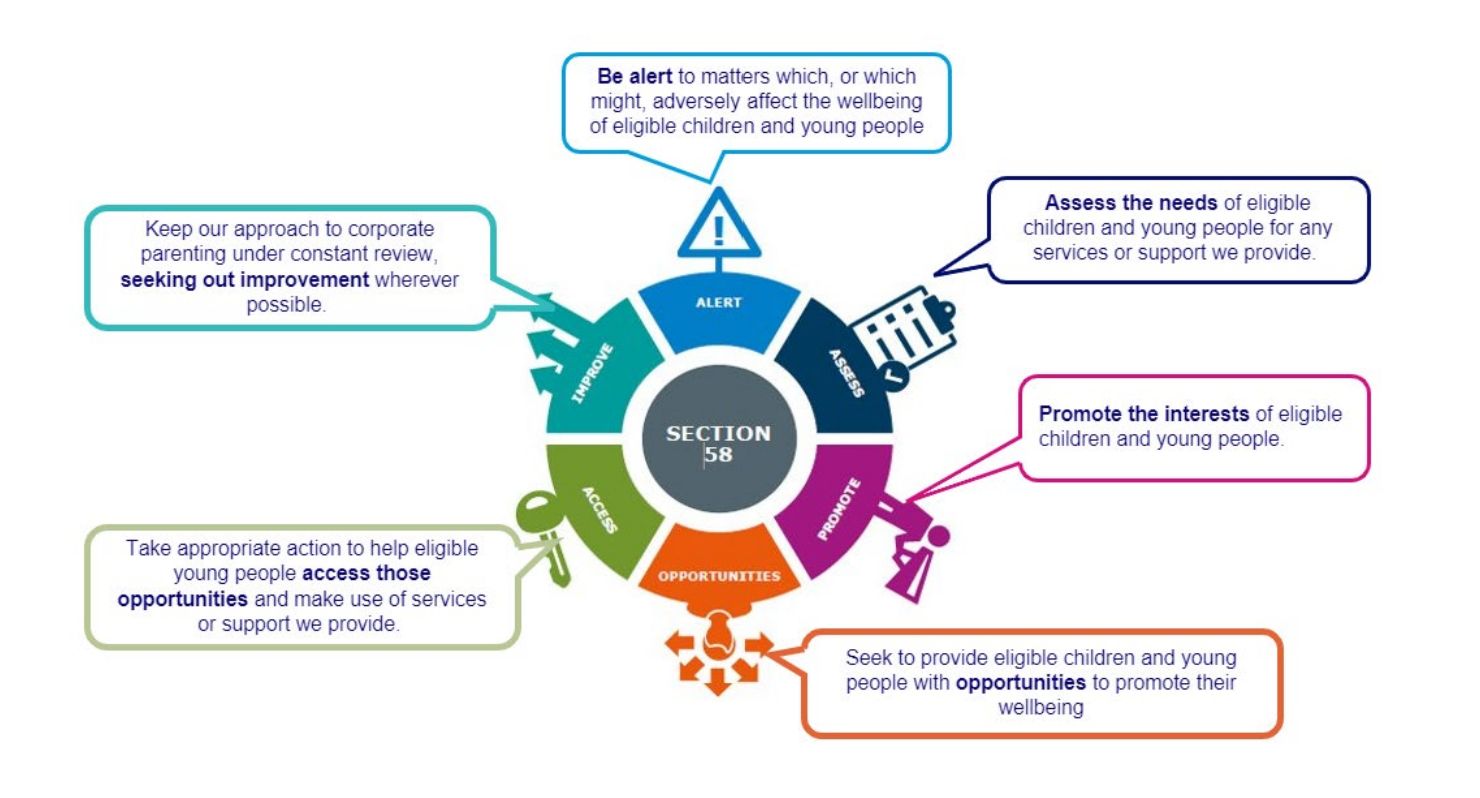
I am delighted to introduce ILF Scotland’s Corporate Parenting Plan for 2024 to 2027. This is our second Corporate Parenting Plan and as a public body of the Scottish Government, we are committed to supporting Scottish Ministers in their role as corporate parents. Our new plan outlines a number of objectives with the aim of ensuring that we continue to reach care experienced people who are eligible for our funding and build on our partnerships with other Corporate Parents.
ILF Scotland specifically supports young disabled people aged 16 to 25 through our Transition Fund. This Fund aims to help young people transitioning from school or children’s services to be more independent, to continue spending time with other people, and to be active in their communities. Since the inception of the Fund, ILF Scotland has supported over 9,000 young people and through the course of our first Corporate Parenting Plan, we have seen the number of care-experienced young people accessing the Fund double from 7% to 14%.
Additionally, we are delighted by the re-opening of our Independent Living Fund from April 2024, whereby applicants from 16 years of age with the most complex needs can apply for funding, allowing them to live the independent lives they need and deserve.
We made good progress against our 2021 to 2024 Corporate Parenting Action Plan. We will continue to engage with a wide range of stakeholders including care experienced young people. We plan to better target both our fund resources towards care experienced young people who can potentially benefit from our funding to bring about transformational change.
Peter Scott OBE, CEO, ILF Scotland
ILF Scotland is a Non-Departmental Public Body and a Company Limited by Guarantee, governed by a Board of Directors, appointed by and accountable to Scottish Ministers.
ILF Scotland has developed its own vision, mission and values, which we use to inform our business priorities and draw on to influence the approach we take to achieve our goals, including those set out in this Corporate Parenting Plan.
All disabled people, and those with a long-term health condition, can access what they need to lead an independent life.
To support disabled people, empowering them to lead their fullest lives.
The core principle of ILF Scotland is that disabled people have the same rights, freedoms and abilities to lead the fullest lives they can, free from discrimination and on an equal basis with others.
Our Delivery Plan 2020 to 2023 (extended to 2025) sets out how we will deliver our key business objectives:
Strategic Priority 1:
Facilitate disabled people’s rights to Independent Living
Strategic Priority 2:
Be leaders in enabling Independent Living
Strategic Priority 3:
Operate high-quality and efficient services
ILF Scotland operates two funds. The main Independent Living Fund, which provides financial awards to around 3,000 people in Scotland and Northern Ireland to help them pay for support to live independently at home, in their communities. This Fund re-opened in Scotland in 2024, having been closed to new applicants since 2010. The Fund will now be available to applicants from age 16, thereby potentially reaching care experienced young people and providing long term support.
The Transition Fund, opened in 2017, supporting young disabled people aged 16 to 21 to become more active and to participate in their communities. In November 2019, the Scottish Government extended the age range to 25 years so that more young people might benefit from the Fund. This expanded age range also aligned with the age range associated with looked after and care experienced young people.
The Children and Young People (Scotland) Act 2014 defines corporate parenting as "the formal and local partnerships between all services responsible for working together to meet the needs of looked after children, young people and care leavers".
The legislation is a key part of the Scottish Government’s strategy for making Scotland the best place in the world to grow up. The Act established a new legal framework within which public services are to work together in support of children, young people and families in Scotland.
The Statutory Guidance on Corporate Parenting defines it as “An organisation’s performance of actions necessary to uphold the rights and safeguard the wellbeing of a looked after child or care leaver, and through which physical, emotional, spiritual, social and educational development is promoted.” (Scottish Government, 2015).

The legislation names Scottish Ministers as the Corporate Parent. ILF Scotland is not a Corporate Parent in its own right but as a public body, effective from 2020, we have a duty to contribute to the success of the Scottish Government’s Corporate Parenting role. Under the legislation, Corporate Parents have a duty to children and young people aged 16 to 25.
ILF Scotland’s key function is to empower disabled people to live independently by providing support through our funds. In administering the Transition Fund, we commit to try to improve our understanding corporately of the needs of care experienced young people up to and including the age of 25, so that we might better target our service to them as well as providing the best advice and assistance we can. We do this by working with other corporate parents and care experienced young people to identify how we can improve our plans, services and processes.
All services that work with children and adults are responsible for promoting, supporting and safeguarding the wellbeing of all children and adults at risk of harm and for ensuring that members of the public know who to contact if they are concerned about a child or adult at risk of harm.
ILF Scotland considers that all staff have a duty to report concerns of harm. Our policy is that if any ILF Scotland staff member becomes aware of potential or actual harm, they will act with or without the consent of the ILF Scotland applicant / recipient, or of the person affected, by providing information in the form of a referral to the relevant local authority and in line with the policy of that local authority. This will normally involve using an agreed referral form or by telephone.
Our Protection of Adults and Children policy can be found at Policy TF05 Protection of Children and Adults.
ILF Scotland aims to enable disabled people to live independent lives, and to exercise choice and control over how each recipient of the fund achieves their own independent living outcomes.
Independent living means, “Disabled people have the same freedom, choice, dignity and control as other people at home, at work, and in the community. It does not mean living by yourself or looking after yourself on your own. It means the person has rights to practical assistance and support to participate in society and live an ordinary life.” (Independent Living in Scotland Project, 2008).
We aim to adopt a human rights approach to all that we do. In particular, we seek to ensure our actions support the realisation of Article 19 of the United Nations Convention on the Rights of Persons with Disabilities - “living independently and being included in the community”.
The UNCRC is an international human rights treaty that covers all aspects of children’s lives. It encompasses civil, political, economic and cultural rights.
The foreword of the UNCRC highlights the importance of: “recognising that the child, for the full and harmonious development of his or her personality, should grow up in a family environment, in an atmosphere of happiness, love and understanding.”[1]
The United Nations Convention on the Rights of the Child (Incorporation) (Scotland) Bill was unanimously passed by the Scottish Parliament, which means that after the completion of all procedures the UNCRC will become part of Scottish Law.
As a public body, we play a role in supporting the Scottish Government to embed children’s rights and wellbeing across policy and practice. As a Corporate Parent, we must ensure our everyday decisions are grounded in these rights.
This Corporate Parenting Plan sets out how we will help to deliver Scottish Ministers’ statutory obligations as a Corporate Parent. We have taken a collaborative approach to developing our plan and have worked closely with partner agencies including the Centre for Excellence for Looked after Children in Scotland (CELCIS), the Office of the Children’s Commissioner for Scotland and Who Cares? Scotland. We have asked for feedback from care experienced young people via our contact with Social Work Teams in Health & Social Care Partnerships and have involved staff from key business areas within our organisation. Our Board has contributed to the plan and fully endorses it.
If you have any questions about the content of this plan, you can contact us by letter, phone or email:
ILF Scotland
Denholm House
Almondvale Business Park
Almondvale Way
Livingston
EH54 6GA
Email: enquiries@ILF.scot
Phone: 0300 200 2022
We will continue to develop existing relationships with other Corporate Parents to make sure that ILF Scotland remains alert to the needs of care experienced young people to inform our policy and practice.
Actions:
We will assess the requirements of care experienced young people to ensure we meet their needs.
Actions:
We will develop staff awareness of corporate parenting across our organisation.
Actions:
We will ensure access to our services for care experienced young people.
Actions:
We will consider where we could improve our services and processes for care experienced young people.
Actions: